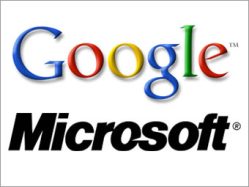 Once the anticompetitive super-villain of the technology industry, Microsoft now finds itself on the other side of the battle after the company filed an antitrust lawsuit against Google on Thursday that accuses the search giant of taking measures to push out Microsoft and other competitors in the European market.
Once the anticompetitive super-villain of the technology industry, Microsoft now finds itself on the other side of the battle after the company filed an antitrust lawsuit against Google on Thursday that accuses the search giant of taking measures to push out Microsoft and other competitors in the European market.
Microsoft first announced its plans to file the suit with the European Commission on Wednesday in a blog post by Microsoft senior vice president and general counsel Brad Smith.
“Google has done much to advance its laudable mission to ‘organize the world’s information,'” writes Smith, “but we’re concerned by a broadening pattern of conduct aimed at stopping anyone else from creating a competitive alternative.” Because of this, Microsoft has “decided to join a large and growing number of companies registering their concerns about the European search market. “
Microsoft’s lawsuit follows similar anticompetition complaints by four other companies in Europe, including UK price comparison site Foudem, French legal search engine ejustice.fr and its parent company 1plusV, and German shopping site Ciao, which is owned by Microsoft. These claims say that Google gives preference to its own search products, like Google Product Search, over competing services.
According to Microsoft, Google’s unwillingness to let the Microsoft’s Bing search engine (and Yahoo! search, which is powered by Bing) fully index Google-owned sites like YouTube prevents Bing from offering fully informed searches to its users.
Also, Microsoft says Google blocks its Windows Phone mobile operating system from accessing vast amounts of metadata associated with YouTube videos. “We just need permission to access YouTube in the way that other phones already do, permission Google has refused to provide,” writes Smith.
Lastly, Microsoft says Google’s ad contracts stifle competition by preventing companies that use Google’s ad platform from using third-party software that compares ad pricing between various companies and enable them to easily switch to another ad service.
While Microsoft and Yahoo! control about 25 percent of the search market share in the US, the discrepancy is far larger in Europe, where Google owns roughly 95 percent of the search market.
Once the subject of multiple antitrust lawsuits in the US and Europe, Microsoft faces a steep uphill battle to convince regulators that Google’s practices are truly anticompetitive, especially since users can easily just use another search engine.


